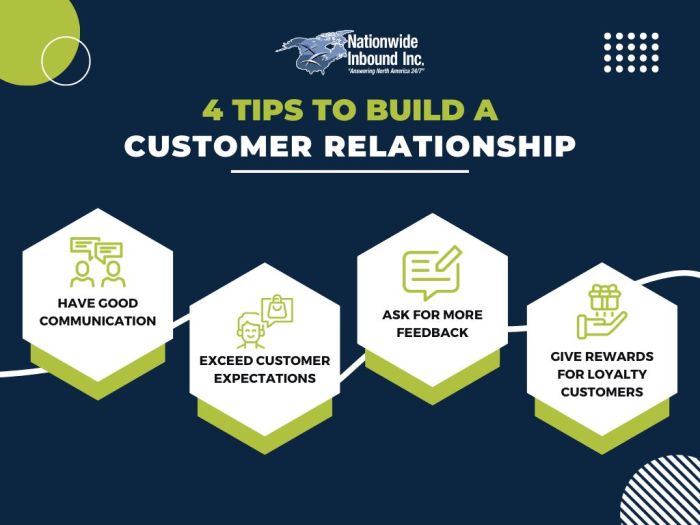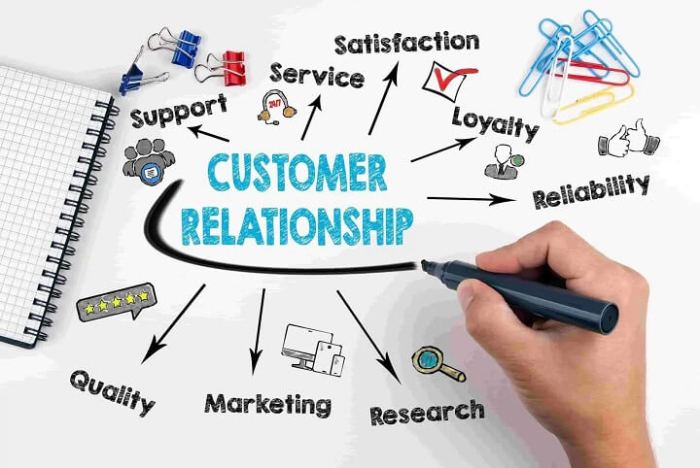Customer Relationship Tips: Get ready to dive into the world of building strong connections and fostering loyalty with these essential tips that will take your business to the next level. From effective communication strategies to building trust and handling feedback, this guide has got you covered with everything you need to know to master customer relationships.
Importance of Building Customer Relationships

Building strong customer relationships is crucial for the success of any business. By establishing a connection with your customers, you create loyalty and trust, leading to repeat business and referrals. Successful businesses understand the value of prioritizing customer relationships and have reaped the benefits in various ways.
Enhanced Customer Loyalty
Strong customer relationships result in enhanced brand loyalty. When customers feel valued and appreciated, they are more likely to continue doing business with your company. For example, companies like Apple and Amazon have built a loyal customer base by providing exceptional customer service and personalized experiences.
Increased Customer Retention
Positive customer relationships also lead to increased customer retention. Customers are more likely to stay with a company that they have a good relationship with, even if competitors offer lower prices. For instance, companies like Zappos have focused on building strong relationships with customers, resulting in high retention rates.
Strategies for Improving Customer Relationships
Personalize interactions
Address customers by name and tailor your communications to their preferences.
Listen to feedback
Actively seek feedback from customers and make improvements based on their suggestions.
Provide exceptional customer service
Respond promptly to inquiries and resolve issues promptly to show customers you value their business.
Reward loyalty
Implement loyalty programs to incentivize repeat business and show appreciation for long-term customers.
Effective Communication Strategies: Customer Relationship Tips
Effective communication plays a crucial role in nurturing customer relationships. It is essential for businesses to establish clear and open lines of communication to understand customer needs, address concerns, and build trust.
Different Communication Channels
Businesses can utilize various communication channels to connect with customers, including:
- Phone calls: Providing a direct and personal way to communicate with customers.
- Email: Offering a convenient and efficient method to send updates, promotions, and respond to inquiries.
- Social media: Engaging with customers through platforms like Facebook, Twitter, and Instagram to build relationships and address feedback publicly.
- Live chat: Offering real-time support and assistance to customers visiting the website.
- In-person interactions: Providing face-to-face communication opportunities through events, meetings, or store visits.
Tips for Active Listening and Responding
Active listening is key to effective communication with customers. Some tips include:
- Give your full attention and avoid distractions when interacting with customers.
- Show empathy and understanding by acknowledging their concerns and feelings.
- Clarify information by summarizing what the customer has said before responding.
- Respond promptly and professionally, providing helpful solutions or answers to their inquiries.
Personalized Communication for Customer Satisfaction
Personalized communication can enhance customer satisfaction by:
- Addressing customers by their name in emails or interactions to make them feel valued.
- Offering tailored recommendations based on their preferences and purchase history.
- Sending personalized thank you notes or follow-up messages to show appreciation for their business.
- Using customer data to anticipate their needs and provide proactive support before they even ask for it.
Building Trust and Credibility
Building trust and credibility is essential in maintaining strong customer relationships. When customers trust a business, they are more likely to remain loyal and recommend the business to others. Credibility, on the other hand, establishes the reputation of a business and its ability to deliver on promises.
Importance of Trust in Customer Relationships
Trust forms the foundation of any successful customer relationship. Without trust, customers may be hesitant to engage with a business, make repeat purchases, or provide valuable feedback. Building trust helps to create a sense of loyalty and reliability between the business and its customers.
Building Credibility to Gain Customer Trust
Businesses can build credibility by consistently delivering high-quality products or services, being transparent in their practices, and honoring commitments made to customers. By showcasing expertise in their field and maintaining a positive reputation, businesses can instill trust in their customer base.
Transparent Practices for Fostering Trust
Examples of transparent practices that help in fostering trust include providing clear and accurate information about products or services, being honest about pricing and policies, and promptly addressing any customer concerns or complaints. Transparency creates an environment of openness and honesty, which is crucial for building trust.
Strategies for Maintaining Trust and Credibility Over Time
To maintain trust and credibility over time, businesses should focus on consistent communication with customers, seeking feedback to improve their offerings, and resolving any issues promptly and effectively. By staying true to their values and commitments, businesses can continue to build strong relationships with their customers.
Handling Customer Feedback

Customer feedback is a valuable tool in improving relationships with clients. It provides businesses with insights into what customers like, dislike, and how they perceive the overall experience. By actively listening to feedback, companies can make necessary adjustments to enhance customer satisfaction and loyalty.
Best Practices for Collecting and Analyzing Customer Feedback
- Utilize surveys, feedback forms, and comment cards to gather customer opinions.
- Monitor social media platforms and online review sites for feedback.
- Analyze data trends to identify common issues and areas for improvement.
- Implement a system for categorizing and prioritizing feedback based on impact.
Successful Implementation of Feedback to Enhance Customer Experience, Customer Relationship Tips
Example: A restaurant uses customer feedback to revamp its menu, offering more popular dishes and removing items with low satisfaction ratings. This leads to an increase in customer satisfaction and repeat business.
Tips for Responding to Feedback
- Respond promptly to all feedback, whether positive or negative, to show customers that their opinions are valued.
- Express appreciation for positive feedback and acknowledge the specific aspects that customers enjoyed.
- Apologize for negative experiences and offer solutions or compensation to address customer concerns.
- Follow up with customers after resolving issues to ensure satisfaction and build trust.
